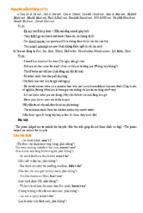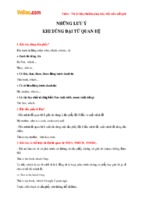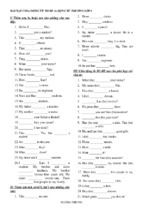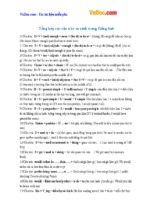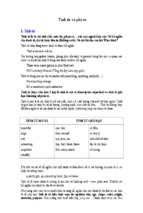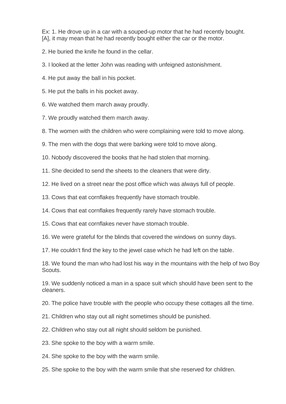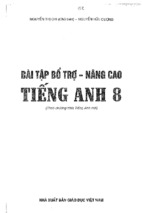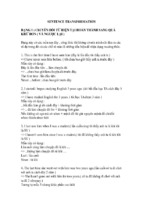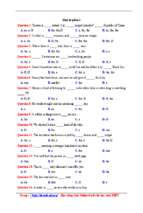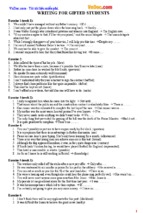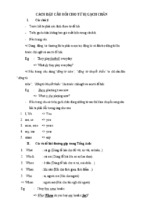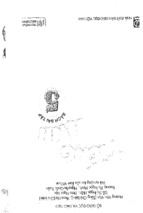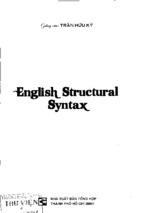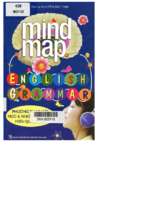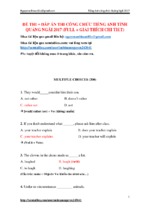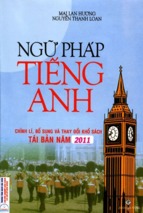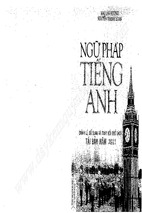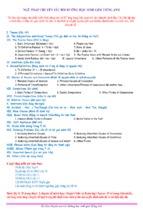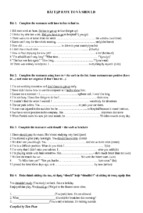Tong hop de thi chuyen Anh Olympic 30-4
UBND tØnh vòng tµu
Së Gi¸o dôc - §µo T¹o
§Ò chÝnh thøc
Kú thi tuyÓn sinh vµo líp 10 thpt chuyªn
N¨m häc 2009 - 2010
M«n thi: TiÕng Anh 9 (Cho thÝ sinh thi vµo chuyªn Anh)
Thêi gian: 120 phót ( kh«ng kÓ thêi gian giao ®Ò )
Ngµy thi: 25/ 6/ 2009
A. pronunciation (10 points).
I. Choose the word (A, B, C or D) that has
from the others in each group. (5 points)
1. A. author
B. other
2. A. forest
B. control
3. A. industry
B. translate
4. A. baggage
B. courage
5. A. advantage
B. addition
the underlined part pronunced differently
C. there
D. they
C. product
D. ecology
C. construction
D. satisfy
C. damage
D. invasion
C. advertise
D. adventure
II. Choose the word (A, B, C or D) whose main stress pattern is not the same as that of the
others. (5 points)
1. A. deposit
B. festival
C. institute
D. resident
2. A. surprising
B. astonishing
C. amazing
D. interesting
3. A. interview
B. industry
C. essential
D. difficult
4. A. extreme
B. generous
C. lonely
D. clothing
5. A. friendly
B. extra
C. along
D. orphanage
B. VOCABULARY AND GRAMMAR (40 points).
I. Choose the best answers to completes each sentence. (10 points)
1. One problem for teacher is that each student has his/ her own ________ needs.
A. separate
B. divided
C. individual
D. distinctive
2. I was ________ in the book I was reading and didn’t hear the phone.
A. submerged
B. distracted
C. gripped
D. engrossed
3. If we hurry, we might get there ________ to catch the early train.
A. right
B. in time
C. on time
D. before time
4. To get a passport, you must send in your birth ________ and two photos.
A. certificate
B. licence
C. paper
D. card
5. She tries to set ________ an hour a week for practice.
A. about
B. down
C. aside
D. in
6. ________ stay the night if it’s too difficult to get home.
A. At all costs
B. By all means
C. In all
D. On the whole
7. Robert and his wife ________ to my house for tea yesterday evening.
A. came round
B. came about
C. came down
D. came away
8. Each of the guests ________ a bunch of flowers.
A. are given
B. is given
C. were given
D. give
9. To everyone’s surprise, Mr Brown ________ at the Trade Union meeting.
A. turned in
B. turned over
C. turned up
D. turned round
10. Everyone burst out laughing. There was a lot of ________.
A. laughs
B. laughter
C. laughings
D. laugh
II. Give the correct form of the verbs in brackets. (10 points)
1. I (meet) ________ John before I (be) ________ a fortnight in Paris.
2. The children were frightened because the lights suddenly (go) ________ out and they (sit)
________ in the dark.
3. What tune (play) ________ when we (come) ________ in?
4. She was badly hurt when her car hit another car. If she (wear) ________ her seat belt, she (not
hurt) ________ so badly.
5. Coming into the room he (see) ________ Mary where he (leave) ________ her.
III. Give the correct form of the verbs to complete the passage. (10 points)
1. We go to the restaurant for ________ whenever we ‘re tired of eating meat. (vegestable)
2. Don’t worry. I ‘ll be waiting for you at the ________ to the pagoda . (enter)
3. The old theater of our city is being enlarged and ________. (modern)
4. Advertisements acount for three fourths of the ________ of the newspaper. (come)
5. What is the ________ of the adjective “solid”. ( oppose)
6. ________ should complain if they are not satisfied with the service they recieve. (Consume)
7. If your work is ________ you won’t get a raise. (satisfy)
8. ________ are alarmed by the rate at which tropical rainforest are being destroyed.(Conserve)
9. The athletes take part in the Olympic Games in the true spirit of ________. (sport)
10. You can never be sure what he is going to do. He is so ________. (predict)
IV. Arrange these sentences to make a complete passage (10 points).
1
a. As they built bigger and bigger ships, they were able to sail further and further away.
b. They don’t really mean that the world is getting smaller, of course.
c. They found that as they sailed further away from their home countries, the world became
bigger.
d. Then men began to use ships to explore the world.
e. Today there are no undiscovered countries left to put on the map, but there are many new
worlds to discover out in space.
f. But 2,300 years ago the Egyptians and the Greek thought that the world was very small and
flat that around it was the ocean.
g. We often hear people saying that the world is getting smaller.
h. So they had to make new maps to show the countries that they found.
i. And they discovered new countries that they didn’t know about.
j. What they mean is that with modern means of transport, we can now reach every part of the
world very quickly.
C. READING (30 points).
I. Read the passage below and choose the best answer for each question. (5 points)
People have been playing with marbles for thousands of years. The first marbles were
probably either river stones that happened to be naturally round enough to roll or, more likely,
rounded globs of clay that were baked hardness. Such very old clay marbles have been found in
both Greek and Roman ruins, and quartz spheres have been dated at around 6000 B.C. Harder
and more durable marbles tend to inspire different kinds of games than soft clay marbles, which
crack very easily. So with the advent of hand rounded and polished marbles made of agate or
some other rugged, igneous rock, the ‘golden age’ of marbles and marble play flowered. Stone
marbles began to appear in the early 1800s in what is now the southern part of Germany. Shortly
after, handmade glass marbles appeared in the same part of Europe. For the next 120 years,
marbles and marble playing-there were literally hundred of games - flourished in both Europe
and America. Marble players developed their own vocabulary for different sizes and materials of
marbles, as well as for the many kinds of games to be played and the way marbles were used in
the games. For example, if you were going to play a game of Ring-Taw, one of the most popular
and enduring marbles games, you would lag for the first shot, and then knuckle down from the
baulk, trying your best to get a mib or two with your opponent’s immie.
1. The author makes the point in the passage that playing with marbles __________.
A. has been going on since ancient times
C. is losing popularity
B. is a relatively recent phenomenon
D. is a very expensive pastime
2. According to the passage, which of the following was the least used substance for making
marbles?
A. agate
B. glass
C. rock
D. clay
3. It can be inferred from the passage that the use of marbles became very popular in Europe and
America __________.
A. in the 18th century
C. in 6000 B.C
B. in the 1970s
D. after glass marbles were developed
4. We can infer from the passage that marble playing __________.
A. is a game only for children
C. is played according to one set of rules
B. has many variations in games
D. uses only one kind of marble
5. We can conclude from lines 11-12 of the passage that the terminology of marble playing is
__________.
A. specialized
C. easy to understand
B. used only by children
D. derived from an ancient language
II. Read the text and decide which answer (A, B, C or D) best fits each space. (15 points)
Look on the bright side
Do you ever wish you were more optimistic, some one who always (1) _______ to be
successful? Having some one around who always (2) _______ the worst isn’t really a lot of (3)
_______ we all know someone who sees a single cloud on a sunny day and says,b “It looks (4)
_______ rain.” But if you catch yourself thinking such things, it’s important to do something (5)
_______ it. You can change your view of life, (6) _______ to psychologists, it only takes a little
effort, and you’ll find life more rewarding as a (7) _______ . Optimism, they say, is partly about
self-respect and confidence, but it’s also a more positive way of looking at life and all it has to
(8) _______ . Optimists are more (9) _______ to start new projects and generally more prepared
to take risks.
Upbringing is obviously very important in forming your (10)
_______ to the world. Some people are brought up to (11) _______ too
much on others and grow up forever blaming other people when
anything (12) _______ wrong. Most optimists, on the (13) _______ hand,
have been brought up not to (14) _______ failure as the end of the
world-they just (15) _______ with their lives.
1. A. counted
B. expected
C. felt
D. waited
2
2. A. worries
B. cares
C. fears
D. doubts
3. A. musement
B. play
C. enjoyment
D. fun
4. A. so
B. to
C. for
D. like
5. A. with
B. against
C. about
D. over
6. A. judging
B. according
C. concerning
D. following
7. A. result
B. reason
C. purpose
D. product
8. A. supply
B. suggest
C. offer
D. propose
9. A. possible
B. likely
C. hopeful
D. welcome
10. A. opinion
B. attitude
C. view
D. position
11. A. trust
B. believe
C. depend
D. hope
12. A. goes
B. falls
C. comes
D. turns
13. A. opposite
B. next
C. other
D. far
14. A. regard
B. respect
C. suppose
D. think
15. A. get up
B. get on
C. get out
D. get over
III. Fill in each blank with one suitable word to complete this passage. (10 points)
Travelling to all corners of the world is (1) _______ easier and easier. We live (2) _______ a
global village, but how well do we know and understand each other ? Here is (3) _______ simple
test. Imagine you have arranged a meeting at 4 p.m . What time should you expect your foreign
business colleagues to arrive? If they are German, they ‘ll be exactly (4) _______ time. If they
are American, they ‘ll probably be 15 minutes early. If they are Bristish, they be 15 minutes (5)
_______, and you should allow up to an hour for the Indians. Therefore, these are some small
advice in (6) _______ not to behave badly abroad. In France you shouldn’t sit down in a cafard
untill you are shaken hands with everyone you know.In Afghanistan you ‘d better spend at last 5
minutes (7) _______ hello. In Pakistan you mustn’t wink. It is offensive. In the Middle East
you must never use the left hand for greeting, eating, drinking or smoking. Also, you should care
not to admire (8) _______ in your host’s home. They will feel that they have to give it to you.In
Russia you must your hosts drink for drink or they will think you are unfriendly. In Thailand you
should clasp your hands (9) _______ and lower your head and your eyes when you greet
someone. In America you should eat your hamburger with both hands and as quickly as (10)
_______. You shouldn’t try to have a conversation until it is eaten.
D. WRITING (20 points).
I. Rewrite the sentences in such a way that they mean almost the same as those printed
before them. (10 points)
1. My brother studies now harder than he used to.
My brother .............................................................................................................................
2. Please don’t ask me that question.
I’d rather ................................................................................................................................
3. I last saw Bob when I was in Ho Chi Minh City.
I haven’t .................................................................................................................................
4. John only understood very little what the teacher said.
John could hardly ..................................................................................................................
5. Tom will be twenty next week.
It’s Tom’s ..............................................................................................................................
6. She is fond of her nephew although he behaves terribly.
She is fond of her nephew in .................................................................................................
7. He prefers reading books to watching TV.
He would ...............................................................................................................................
8. He didn’t hurry, so he missed the bus.
If ............................................................................................................................................
9. The train takes longer than the plane.
The plane ...............................................................................................................................
10. I don’t suppose you have change for 2 pounds, do you?
Do you happen .......................................................................................................................
II. Use the promps provided to write full sentences to make a complete letter. (10 points)
Dear Sir / Madam,
1. I / like / express / concern / increasing number / karaoke bars / city.
2. There be / lot / reason / I object / places.
3. Firstly, / owners / take / much money / those / come / sing.
4. Secondly, / they cause / much noise / neighborhood.
5. Thirdly, / there / number / pupils / play truant / just / go / those places / sing.
6. Last / least / these bars / do harm / appearance / city / because / their / ugly flashing lights.
7. I want / say / I / not / old fashioned person.
8. I hope / authority / take / matter / careful consideration.
9. I / not mean / ban them / but / there should / effective way / control / this kind / entertainment
places.
3
10. I / look / see / city council / do / this master.
Yours truly, Thomas Cruise.
---------- The end ---------(§Ò thi nµy cã 04 trang)
Hä vµ tªn thÝ sinh: ................................................................................... Sè b¸o danh: ...................
4
5
UBND tØnh vòng tµu
Së gi¸o dôc - ®µo t¹o
®¸p ¸n ®Ò thi tuyÓn sinh vµo líp 10 thpt chuyªn
N¨m häc 2009 - 2010
M«n thi : TiÕng Anh
Thêi gian: 120 phót ( kh«ng kÓ thêi gian giao ®Ò )
§Ò chÝnh thøc
Ngµy thi: 25/ 6/ 2009
A. pronunciation (10 points).
I. Choose the word (A, B, C or D) that has the underlined part pronunced differently
from the others in each group. (5 points) - 1/ each.
1. A
2. B
3. B
4. D
5. C
1. A
2. D
3. C
B. VOCABULARY AND GRAMMAR (35 points).
4. A
5. C
1. C
6. B
4. A
9. C
II. Choose the word (A, B, C or D) whose main stress pattern is not the same as that of
the others. (5 points) - 1/ each.
I. Choose the best answers to completes each sentence (10 points) - 1/ each.
2. D
7. A
3. B
8. B
II. Give the correct form of the verbs in brackets (10 points) - 1/ each.
5. C
10. B
1. met – had been.
4. had been wearing – wouldn’t have been hurt.
2. had gone – were sitting.
5. saw – had left.
3. was being played – came.
III. Give the correct form of the verbs to complete the passage (10 points) - 1/ each.
1. vegetarians
6. consumers
2. entrance
7. untisfactory
3. modernized
8. Conservationists
4. incomes
9. sportsmanship
5. opposite
10.unpredictable
IV. Arrange these sentences to make a complete passage (10 points).
gbj f dci a h e.
C. READING (30 points).
I. Read the passage and choose the best answer to each question (5 points) - 1/ each.
1. A
2. D
3. D
4. B
5. A
II. Read the text and decide which answer best fits each space (15 points) - 1/ each.
1. B
2. C
3. D
4. D
5. C
6. B
7. A
8. C
9. B
10. B
11. C
12. A
13. C
14. A
15. B
II. Fill in each blank with one suitable word to complete this passage ( 10 points) - 1/ each.
1. getting
2. in
3. a
4. on
5. late
6. order
7. saying
8. anything
9. togethet
10. possible
D. WRITING (20 points).
I. Rewrite the sentences in such a way that they mean almost the same as those printed
before them. (10 points)
1. My brother didn't use to study as/ so hard as he does now/ used to study more lazily than he
does now.
2. I’d rather you didn’t ask me that question.
3. I haven’t seen Bob since I was in Ho Chi Minh City.
4. John could hardly understand what the teacher said.
5. It's Tom's twentieth birthday next week.
6. She is fond of her nephew in spite of his terrible behaviour.
7. He would rather read books than watch TV.
8. If he had hurried he would/could have caught / wouldn’t have missed the bus
9. The plane does not take as long as/takes a shorter time than/ is quicker/faster than the train.
10. Do you happen to have change for 2 pounds?
II. Use the promps provided to write full sentences to make a complete … (10 points) - 1/
each.
Dear Sir/ Madam,
1. I would like to express (my) concern about the increasing number of karaoke bars in the/
our city.
2. There are a lot of reasons that/ why I object to these/ those places.
3. Firstly, the owners take too much money from those people who come to sing.
4. Secondly, they cause/ are causing too much noise in/ to the neighborhood.
5. Thirdly, there are a number of pupils who/ that play truant just to go to those places to
sing.
6. Last but not least, these bars do harm to the appearance of the city because of their ugly
flashing light.
6
7. I (also) want to say (that) I am not an old fashioned person.
8. I hope (that) the authority will take this matter into careful consideration.
9. I do not mean to ban them, but there should be an/ some effective way to control this kind
of entertainment places.
10. I look/ am looking forward to seeing the city council doing something about this matter.
Yours truly, Thomas Cruise.
Tæng ®iÓm bµi thi : Tæng sè c©u ®óng/ 10.
---------- The end ----------
UBND tØnh phó yªn
Së Gi¸o dôc - §µo T¹o
§Ò chÝnh thøc
Kú thi tuyÓn sinh vµo líp 10 thpt chuyªn
N¨m häc 2009 - 2010
M«n thi: TiÕng Anh 9 (Cho thÝ sinh thi vµo chuyªn Anh)
Thêi gian: 120 phót ( kh«ng kÓ thêi gian giao ®Ò )
Ngµy thi: 5/ 7/ 2009
A. pronunciation (10 points).
I. Choose the word (A, B, C or D) that has the underlined part pronunced differently
from the others in each group. (5 points)
1. A. clerk
B. terse
C. term
D. jerk
2. A. mouths
B. paths
C. months
D. wreaths
3. A. vehicle
B. rhythm
C. exhume
D. behold
4. A. dormitory
B. information
C. organization
D. forward
5. A. food
B. shoot
C. shook
D. spool
II. Choose the word (A, B, C or D) whose main stress pattern is not the same as that of
the others. (5 points)
1. A. philosopher
B. patriot
C. atmosphere
2. A. pollute
B. severe
C. tragic
3. A. economical
B. personality
C. preparatory
4. A. interrupt
B. interview
C. intervene
5. A. mechanic
B. terrific
C. Arabic
B. VOCABULARY AND GRAMMAR (40 points).
I. Choose the best answers to completes each sentence. (10 points)
1. I am afraid that these regulations have to be __________ with.
7
D. habit
D. humane
D. entertaiment
D. interstellar
D. Pacific
A. complied
B. provided
C. faced
D. met
A. up
B. on
C. in
D. over
A. search
B. be in search
C. look after
D. look for
A. accurate
B. punctural
C. efficient
D. reliable
A. near to
B. ready for
C. on the way
D. about to
A. searched
B. investigated
C. vetted
D. scrutinized
A. Most
B. Almost
C. Each
D. Nearby
A. other
B. expect
C. rather
D. apart
A. blue
B. green
C. yellow
D. white
2. His business is growing so fast that he must take __________ more workers.
3. The police must now __________ the escaped convict in the surrounding countries.
4. You are late again, please try to be __________ in the future.
5. Edward has found a bigger flat and is __________ move into it.
6. All the applicants for the post are thoroughly __________ for their suitability.
7. __________ every part of the world has experienced an earthquake in recent years.
8. He didn’t know anyone at the wedding __________ than the bridge and groom.
9. When Bill saw my new car, he was __________ with envy.
10. He was holding a tiny bird in the __________ of his hand.
A. thumb
B. hole
C. shin
D. palm
II. Give the correct form of the verbs in brackets. (10 points)
1. The man at the corner table (glance) _______ my way to see if I (listen) _______.
2. When I (look) _______ at my suitcase, I could see that somebody (try) ______ to open it.
3. I don’t know what’s the matter with him. He (act) ______ funny since you (be) _______
away.
4. Scarcely they (move) _______ into the new house when their friends (come) _______ in.
5. Just as I (wonder) what to do next, the phone (ring) _______.
III. Give the correct form of the verbs to complete the passage. (10 points)
1. In some areas water has to be boiled to ________ it. (pure)
2. He examined the parcel ________, as he had no idea what it could be. (suspect)
3. How do you ________ the real painting from the fake one ? (different)
4. Don’t worry about the volcano. It’s been ________ for years. (act)
5. Leisure habits won’t change much in the ________ future. (see)
6. The conditions in the man’s prison were ________. (human)
7. I object strongly to the ________ of sport. (commerce)
8. A list of ________ events for the autumn is being prepared. (come)
9. Most people who work feel that they are ________. (pay)
10. They frequently ________ the traffic as they march through the streets. (mobile)
IV. Fill in each blank with a suitable prepostion. (10 points)
1. If she takes __________ the job of director, she will have to work harder.
2. The government put __________ the rebellion with great severity.
3. There was a man giving __________ leaflets outside the church.
4. I can’t make __________ the postmark on the letter, it looks like Basing stoke.
5. If he refuses to fall __________ my phans I can probably find someone more co-operative.
6. Diana showed a complete disregard __________ her own safety.
7. We walked on tiptoe __________ fear of being discovered.
8. Mary broke down __________ tears when we told her about the accident.
9. The car pulled __________ beside me and the driver asked me the way to the post office.
10. I had to send __________ an electrician to mend the switch.
C. READING (30 points).
I. Read the passage below and choose the best answer for each question. (5 points)
Man is a land animal, but he is also closely tied to the sea. Throughout history the sea has
served the need of man. The sea has provided man with food and a convenient way to travel to
many parts of the world. Today, nearly two thirds of the world’s population live within 80 km of
the sea coast.
In the modern technological world, the sea offers many resources to help mankind survive.
Resources on land are beginning to be used up. The sea, however, still can be hoped to supply
many of man’s needs. The list of riches of the sea yet to be developed by man’s technology is
impressive. Oil and gas explorations have been carried out for nearly 30 years. A lot of valuable
minerals exist on the ocean floor ready to be mined.
Fish farming promises to be a good way to produce large quantities of food. The culture of
fish and shellfish is an ancient skill practised in the past mainly by Oriental people.
Besides oil and gas, the sea may offer new sources of energy. Experts believe that the warm
temperature of the ocean can be used in a way similar to the steam in a steamship. Ocean
currents and waves offer possible use as a source of energy.
8
Technology is enabling man to explore ever more deeply under the sea. The development of
strong, new materials has made this possible.
The technology to harvest the sea continues to improve. Experts believe that by the year
2050s the problems that prevent us from fully exploiting the food, minerals, and energy sources
of the sea will be largely solved.
1. The best title for this passage is ___________.
A. Sea Harvest.
C. Sea Food.
B. Technology and the Exploiting of the Sea.
D. Man and Sea.
A. food, energy sources and minerals.
C. minerals and oil.
B. fish and oil.
D. ocean currents and waves.
A. it provides man with sea food.
C. it supplies man with minerals.
B. it offers oil to man.
D. all of the above.
2. The major things that the sea offers man are ___________.
3. The sea serves the needs of man because ___________.
4. The word Oriental people in the fourth paragraph probably means ___________.
A. European people.
B. African people.
C. Asian people.
D. American people.
5. We can conclude from the passage that ___________.
A. the sea resources have largely been used up.
B. the sea, in a broad sense, hasn’t yet been developed.
C. the problems that prevent us from fully exploiting the sea have already been solved.
D. by the year 2050, the technology will be good enough to exploit all the sea resources.
II. Read the text and decide which answer (A, B, C or D) best fits each space. (15 points)
street papers
The problem of homelessness is an international one. In the capital cities of the world, the (1)
_______ of people begging on the streets is becoming increasingly (2) _______. But all over the
world, homeless people are taking the future into their own (3) _______. By selling “street
papers” they no longer need to beg for a (4) _______.
The concept of the street paper is (5) _______. It is sold by homeless and ex-homeless people
who buy it at a (6) _______ price of 30 p and sell it to the public for 70 p, keeping 40 p for
themselves. If they have no money, then they can get the first ten copies on (7) _______ and pay
for them later. Every paper seller receives training and is given a special (8) _______ badge.
The paper itself (9) _______ articles of general and social interest, film and book (10) _______,
cartoons and the (11) _______ celebrity interview. Advertising and sales (12) _______ most of
the income, and all profits go (13) _______ into helping homeless people.
The Big Issue is the street paper of the British homeless. It was set up in 1991 and (14)
_______ then it has helped hundreds of people to get (15) _______ the streets and
back into society.
1. A. sight
B. vision
C. look
D. view
2. A. usual
B. common
C. rare
D. routine
3. A. heads
B. shoulders
C. hands
D. mouths
4. A. life
B. living
C. being
D. pay
5. A. easy
B. straight
C. plain
D .simple
6. A. stuck
B. steady
C. held
D. fixed
7. A. credit
B. cheque
C. cash
D. card
8. A. character
B. personality
C. manner
D. identity
9. A. consists
B. contains
C. keeps
D. gets
10. A. stories
B. reviews
C. opinions
D. views
11. A. sometimes
B. often
C. occasional
D. seldom
12. A. give
B. provide
C. show
D. offer
13. A. back
B. out
C. through
D. forward
14. A. from
B. of
C. for
D. since
15. A. out
B. away
C. off
D. up
III. Fill in each blank with one suitable word to complete this passage. (10 points)
ADVICE TO YOUNG PEOPLE ABOUT TO START WORK
In these days of high unemployment, it is often difficult (1) __________ young people to find
a job. If they are lucky (2) __________ to be asked to go for an interview, they may find (3)
__________ there are at least 20 other applicants for the (4) __________. If a company is
thinking of offering (5) __________ a job, they will ask you for at least one reference from either
your previous employer (6) __________ someone who knows you well. (7) __________ taking
9
up your job, you may have to sign a contract. You will probably have to do some training, (8)
__________ help you to do the job more successfully. Once you have decided that this is your
chosen career, you will then have to work (9) __________ to try and get promotion, which
usually brings more responsibility and more money! If you are unlucky, you may be made
redundant, and not be able to find (10) __________ job. It is also a good idea to pay some money
into a pension scheme, which will help you to look after yourself and your family when you are
retired. Finally, good luck!
D. WRITING (20 points).
I. Rewrite the sentences using the words in bold, in such a way that it means the same as
the one given. Do not alter these words in any way. (10 points)
1. They’re telling me that I must make a decision soon. (pressure)
…………………………………………………………………………………………………
2. His smooth manner didn’t deceive us. (taken)
…………………………………………………………………………………………………
3. I really must answer all these letters. (get down)
…………………………………………………………………………………………………
4. Don’t run away with the idea that this work is easy. (conclusion)
…………………………………………………………………………………………………
5. I’m trying to concentrate, but all that noise you’re making is distracting me. (putting)
…………………………………………………………………………………………………
6. Nobody expected her to lose, but she did. (against)
…………………………………………………………………………………………………
7. You must concentrate on your work more. (apply)
…………………………………………………………………………………………………
8. She will probably be elected. (stands)
…………………………………………………………………………………………………
9. The boss was annoyed because his secretary came to work late. (objected)
…………………………………………………………………………………………………
10. The demand for tickets was so great that people queued day and night. (such)
…………………………………………………………………………………………………
II. Use the promps provided to write full sentences to make a complete letter. (10 points)
Dear John,
1. last letter / you / kindly offer / put / me / your flat / I be / Berlin.
2. I/ be / afraid / I / unable / take / offer / time being.
3. My father / sick / I / to stay / home / care / him.
4. He / very sick / I cannot / him / alone.
5. My brother / also / help / look / Dad / but / he now / away / business trip / Paris.
6. I / hope / be able / come / Berlin / later / end / year, / perhaps / January.
7. If / room / free / I / glad / stay / you.
8. I / let / know / phan / soon / possible / order / not interfere / own plan.
9. Thank / much / again / offer.
10. I / not / wait / see / you / Berlin / but / then / goodbye.
With love,
Maria.
---------- The end ---------(§Ò thi nµy cã 04 trang)
10
Hä vµ tªn thÝ sinh: ………………………………………………… Sè b¸o danh: ……………
11
12
§Ò chÝnh thøc
A. pronunciation (10 points).
I. Choose the word (A, B, C or D) that has the underlined part pronunced differently
from the others in each group. (5 points) - 1/ each.
1. A
2. C
3. C
4. B
5. A
1. A
2. C
3. C
4. B
B. VOCABULARY AND GRAMMAR (35 points).
5. C
1. A
6. C
5. D
10. D
II. Choose the word (A, B, C or D) whose main stress pattern is not the same as that of
the others. (5 points) - 1/ each.
I. Choose the best answers to completes each sentence (10 points) - 1/ each.
2. B
7. B
3. B
8. A
4. B
9. B
II. Give the correct form of the verbs in brackets (10 points) - 1/ each.
1. glanced – was listening.
2. looked – had tried.
3. has been acting – have been.
4. had they moved – came.
5. was wondering – rang.
1.
2.
3.
4.
5.
6. inhuman
7. commercialization
8. forthcoming
9. underpaid
10. immobilise/ immobilize
III. Give the correct form of the verbs to complete the passage (10 points) - 1/ each.
purify
suspiciously
differentiate
inactive
foreseeable
IV. Fill in each blank with a suitable prepostion (5 points) - 1/ each.
1. on/ over
2. down
6. for
7. for
C. READING (30 points).
3. out
8. in
4. out
9. up
5. in with
10. for
I. Read the passage and choose the best answer to each question (5 points) - 1/ each.
1. B
2. A
3. D
4. C
5. D
II. Read the text and decide which answer best fits each space (15 points) - 1/ each.
1. A
2. B
3. C
4. B
5. D
6. D
7. A
8. D
9. B
10. B
11. C
12. B
13. A
14. D
15. C
II. Fill in each blank with one suitable word to complete this passage ( 10 points) - 1/
each.
1. for
2. enough
3. that
4. job
5. you
6. or
7. Before
8. which
9. hard
10. another
IV. WRITING (20 points).
I. Rewrite the sentences using the words in bold, in such a way that it means the same
as the one given. Do not alter these words in any way. (10 points) - 1/ each.
1. They are putting pressure on me to make a decision soon.
2. We were not taken in by his smooth manner.
3. I really must get down to answerring all these letters.
4. Don’t come to/ draw the conclusion that this work is easy.
5. I’m trying to concentrate, but all that noise you’re making is putting me off.
6. Against everybody’s expectation, she lost
7. You must apply yourself to your work more.
8. She stands a good chance of being elected.
9. The boss objected to his secretary(‘s) coming to work late.
The boss objected to the fact that his secretary came to work late.
10. It was such a great demand for tickets that people queued day and night.
II. Use the promps provided to write full sentences to make a complete … (10 points) - 1/
each.
Dear John,
1. In your last letter, you kindly offered to put me in your flat while/ when I am in Berlin.
2. I am afraid (that) I am unable to take your offer for the time being.
3. My father is sick that I have to to stay (at) home to take care of him.
4. He is very sick, so I cannot leave him / alone.
5. My brother also helped (to) look after Dad, but he is now away on his/ a business trip in
Paris.
6. I hope to be/ I will be able to come to Berlin later by/ at the end of this year, or perhaps in
January.
7. If the/ your room is free, I am/ would glad to stay with you.
8. I will let you know my phan as soon as possible in order not to interfere with your own plan.
13
9. Thank you very much again for your/ the offer.
10. I cannot wait to see you in Berlin, but then I have to say goodbye.
With love,
Maria.
Tæng ®iÓm bµi thi : Tæng sè c©u ®óng/ 10.
---------- The end ----------
UBND tØnh ®µ n½ng
Së Gi¸o dôc - §µo T¹o
§Ò chÝnh thøc
Kú thi tuyÓn sinh vµo líp 10 thpt chuyªn
N¨m häc 2008 - 2009
M«n thi: TiÕng Anh 9 (Cho thÝ sinh thi vµo chuyªn Anh)
Thêi gian: 120 phót ( kh«ng kÓ thêi gian giao ®Ò )
Ngµy thi: 25/ 6/ 2008
A. pronunciation (10 points).
I. Choose the word (A, B, C or D) that has the underlined part pronunced differently
from the others in each group. (5 points)
6. A. table
B. vegetable
C. innovation
D. stage
7. A. ghost
B. most
C. lost
D. post
8. A. aviation
B. language
C. attraction
D. applicant
9. A. lecturer
B. inventor
C. medium
D. president
10. A. age
B. college
C. change
D. altogether
II. Choose the word (A, B, C or D) whose main stress pattern is not the same as that of
the others. (5 points)
1. A. interesting
B. surprising
C. amusing
D. successful
2. A. understand
B. engineer
C. benefit
D. Vietnamese
3. A. applicant
B. uniform
C. yesterday
D. employment
4. A. paper
B. tonight
C. lecture
D. story
5. A. money
B. army
C. afraid
D. people
B. VOCABULARY AND GRAMMAR (40 points).
I. Choose the best answers to completes each sentence. (10 points)
1. Kathy was as pleased as ________ when she heard she had passed the exam .
A. punch
B. a poppy
C. a sunflower
D. pound notes
2. I haven’t had an accident yet but I’ve had a number of ________ shaves .
A. narrow
B. near
C. close
D. tiny .
3. All the ________ of the dances went to charity .
14
A. results
B. proceeds
C. rewards
D. finances
4. Enough money has been raised to ________ the hospital’s survival .
A. ensure
B. enlarge
C. enable
D. empower
5. Many students do ________ jobs in hotesl over the summerto earn money .
A. low
B. poor
C. menial
D. inferior
6. They could find no _______ of the mising car despite an extensive search.
A. clue
B. remnant
C. indication
D. trace
7. When they retired they bought a tiny ________ in the country .
A. mansion
B. bungalow
C. shack
D. barn
8. It is too early in the ________ to expect many visitors to the town .
A. term
B. season
C. time
D. calendar
9. Is promoting public health ________ as state concern ?
A. necessary
B. necessary being
C. necessarily
D. of necessary
10. There are different kinds of music to ________ your taste.
A. miss
B. fit
C. tight
D. suit
II. Give the correct form of the verbs in brackets. (10 points)
1. He no sooner (reach) __________ the door than he (come) __________ back.
2. I (be) __________ very careful not to hint or remind her in any way of what she (tell)
__________ me.
3. While he (learn) __________ to drive he (have) __________ twenty five accidents.
4. The man at the corner table (glance) __________ my way to see if I (listen) __________.
5. When I (look) __________ at my suitcase, I could see that somebody (try) __________ to
open it.
III. Give the correct form of the verbs to complete the passage. (10 points)
1. The duty of the police is the ________ law and order. ( maintain )
2. Our tomatoes are ________ nicely; they’ll be ready to eat in about a week. (ripe)
3. Look at this picture of Bill and his father, you can see the ________ clearly, can’t you? (like)
4. He said “Good morning” in a most ________ way. (friend)
5. “This is not a good essay”, said the lecturer. “I find your arguments ________” (convince)
6. It’s a lovely old house, I agree, but can we afford to ________ it? (modern)
7. George and I have been friends since ________: he use to live next door. (child)
8. In winter it is important for farmers to provide food and ________ for their animals. (warm)
9. Pele ________ Ronaldo to take part in 2002 World Cup. (courage)
10. Playing for the national team for the first time was an ________ experience for Huynh Duc.
(forget)
IV. There are ten mistakes in the text . Identify each mistake, write it down and give your
correction. (10 points)
As far back as 700 B.C, man has talked about children to be cared for by wolves. 1. ____
Romulus and Remus, the legend twin founders of Rome, were purported to have been 2. ____
cared for by wolves. It is believed that why a she-wolf loses her litter, she seeks a 3. ____
human child to take its place.
This seeming preposterous idea did not become credible until the late nineteenth 4. ____
century when a French doctor actually had found a naked ten-year-old boy wandering 5. ____
in the woods. He did not walk erect, could not speak intelligibly, or could lie relate to 6. ____
people. He only growled and stared of them. Finally the doctor won the boy's 7. ____
confidence and began to work with them. After many long years of devoted and 8. ____
patient instruction, the doctor was able to have the boy to clothe and feed himself, 9. ____
10. ____
recognize and utter a number of word, as well as write letters and form words.
C. READING (30 points).
I. Read the passage below and choose the best answer for each question. (5 points)
Mozart, who was born on January 27, 1756 in the Austrian city of Salzburg, was neither the
first nor the last child prodigy, but he was certainly the greatest. He was born into a moderately
prosperous family where his unmatched musical genius made itself known extremely early.
Mozart began leaning to play harpsichord at three and his earliest known work was composed
in 1761 when he was five, the age at which he also first appeared in public.
From the age of six, when his father took him on the first foreign tour, Mozart toured the
courts and musical centres of Austria, Germany, France, England, Holland, Switzerland and Italy.
It has been calculated that Mozart spent almost a third of his short life - he died at the age of
thirty five – travelling.
As Mozart matured, he continued to tour and give concerts. Mozart also wrote a lot of operas.
His first opera, Mitridate, Re di Ponto, was performed in Milan when he was 14, and it was the
first of many successes in the theatre.
1. How rich was Mozart’s family?
15
A.
B.
Very rich
As rich as a financial
C. Not very rich
D. Very poor
2. When did he take the first step into the world of music as a composer?
A. When he was three
B. When he was five
C. When he was fourteen
D. When he was thirty-five
A. He made so much sightseeing
B. He toured the courts and musical centres
C. He toured only
D. He did nothing
3. What did he do on his first tour to some major European countries?
4. Why is it possible to name Mozart “A travelling composer”?
A. Because he spent almost a third of his short
C. Because he never travelled.
life travelling.
D. Because he had good imagination.
B. Because he liked travelling a lot.
5. What expression in the passage means “an exceptionally clever child” ?
A. A child normal
C. A child prodigy
B. A child clever
D. Child playing harpsichord.
II. Read the text and decide which answer (A, B, C or D) best fits each space. (15 points)
SAVE MONEY ON THE BOOK THAT AIMS TO SAVE ANIMALS
Do you want to take part in the battle to save the world’s wildlife? Animal Watch is the book
which will (1) ________ you in the fight for survival that (2) ________ many of our endangered
animals and show how they struggle on the (3) ________ of extinction .
As you enjoy the book’s 250 pages and over 150 colour photographs, you will have the (4)
________ of knowing that part of your purchase money is being used to (5) ________ animals
(6) ________ from the comfort of your armchair, you will be able to observe the world’s animals
close-up and explore their habitats. You will also discover the terrible results of human (7)
________ for land, flesh and skins.
Animal Watch is packed with fascinating facts. Did you know that polar bears cover their
black noses (8) ________ their (9) ________ so they can hunt their prey in the snow without
being seen, for example? Or that (10) ________ each orang-utan which is captured, one has to
die?
This superb (11) ________ has so (12) ________ Britain’s leading wildlife charity that it has
been chosen as Book of the Year, a (13) ________awarded to books which are considered to have
made a major contribution to wildlife conservation. You will find Animal Watch at a special low (
14) ________ price at all good bookshops, but hurry while (15) ________ last.
1. A. combine
B. involve
C. bring
D. lead
2. A. meets
B. opposes
C. forces
D. faces
3. A. edge
B. start
C. limit
D. end
4. A. satisfaction
B. enjoyment
C. virtue
D. value
5. A. enable
B. help
C. allow
D. assist
6. A. preserve
B. conserve
C. revive
D. survive
7. A. greed
B. interest
C. care
D. concern
8. A. with
B. by
C. for
D. from
9. A. feet
B. claws
C. paws
D. toes
10. A. for
B. at
C. from
D. to
11. A. publicy
B. periodical
C. publication
D. reference
12. A. imposed
B. impressed
C. persuaded
D. admired
13. A. symbol
B. title
C. trademark
D. nickname
14. A. beginning
B. preparatory
C. original
D. introductory
15. A. stores
B. stocks
C. goods
D. funds
III. Fill in each blank with one suitable word to complete this passage. (10 points)
Maybe you recycle cans, glass, and paper. Do you know that nature recycles, too ? One of the
things nature (1) _______ is water. Water goes from oceans, lakes, and rivers into the air. Water
falls from the air as (2) _______ or snow. Rain and snow eventually find their way back to the
oceans. Nature’s recycling program for water is (3) _______ the water cycle.
The water cycle has four stages: storage, evaporation, precipitation, and runoff. Water on
Earth gets stored (4) _______ oceans, lakes, rivers, ice, and even underground. Water goes from
storage into the atmosphere by a process called evaporation. When water evaporates, it changes
from a liquid (5) _______ a gas, called water vapor. Water vapor goes up into (6) _______
atmosphere. Water returns to the Earth as precipitation in rain or snow by changing into drops of
water (7) _______ the air gets cold enough. Clouds are collections (8) _______ water droplets.
Most precipitation falls into the oceans and goes right back into storage.
16
Water that falls on land always flows from (9) _______ places to lower ones. This flow is
called runoff. Water from land flows into streams. Streams join together to make (10) _______
and eventually the water flows into storage in the oceans. Then the water cycle starts all over
again.
D. WRITING (20 points).
I. Rewrite the sentences in such a way that they mean almost the same as those printed
before them. (10 points)
1. If I met the author one day, I'd ask him to sign my copy of this book.
Were I ..........................................................................................................................................
2. He always has his nose in a book and never pays attention to what I say.
If he didn't ...................................................................................................................................
3. Alice and Charles did not decide to move to a bigger house until after the birth of their second
child.
Only when ...................................................................................................................................
4. You are under no obligation to accept their offer.
You can please ............................................................................................................................
5. Martin may not be very well but he still manages to enjoy life.
Martin's poor ...............................................................................................................................
6. The Pacific Ocean is on average deeper than the Atlantic.
The average .................................................................................................................................
7. I don't really like her , even though I admire her achievements.
Much ...........................................................................................................................................
8. There were not nearly as many people there as I had expected.
here were far ................................................................................................................................
9. There was no need for you to have gone to all that trouble.
You ..............................................................................................................................................
10. This is the best essay I have ever written.
Never ...........................................................................................................................................
II. Use the promps provided to write full sentences to make a complete letter. (10 points)
Dear Jane,
1. Not see you / long time.
2. We / really pleased / move to / country /, I / get / fed up / live / London.
3. In/ city/ much traffic / noise / no time / relax.
4. In / country / life / slower / more peaceful.
5. Now / example / able / a walk / with / dog / across fields / before breakfast !
6. Children / enjoy fresh air / make new friends.
7. people/ helpful / kind / friendly .
8. But we miss / friends / London ,especially you.
9. Come / see us soon.
10. We all / look forward / see you again.
Love,
Milly, Bob, Tim and Teresa.
---------- The end ---------(§Ò thi nµy cã 04 trang)
Hä vµ tªn thÝ sinh: ................................................................................... Sè b¸o danh: ..................
17
18
UBND tØnh ®µ n½ng
Së gi¸o dôc - ®µo t¹o
®¸p ¸n ®Ò thi tuyÓn sinh vµo líp 10 thpt chuyªn
N¨m häc 2008 - 2009
M«n thi : TiÕng Anh
Thêi gian: 120 phót ( kh«ng kÓ thêi gian giao ®Ò )
§Ò chÝnh thøc
Ngµy thi: 25/ 6/ 2008
A. pronunciation (10 points).
I. Choose the word (A, B, C or D) that has the underlined part pronunced differently
from the others in each group. (5 points) - 1/ each.
1. B
2. C
3. A
4. C
5. D
1. A
2. C
3. D
4. B
B. VOCABULARY AND GRAMMAR (35 points).
5. C
II. Choose the word (A, B, C or D) whose main stress pattern is not the same as that of
the others. (5 points) - 1/ each.
I. Choose the best answers to completes each sentence (10 points) - 1/ each.
1. A
6. D
2. C
7. B
3. B
8. B
4. B
9. A
II. Give the correct form of the verbs in brackets (10 points) - 1/ each.
6. had no sooner reached - came.
7. was - had told.
8. was learning - had.
5. C
10. A
9. glanced - was listening.
10. looked - had tried.
III. Give the correct form of the verbs to complete the passage (10 points) - 1/ each.
1. mainternance
6. modernise
2. repering
7. childhood
3. likeness
8. warmth
4. friendly
9. encouraged
5. unconving
10. unforgottable
IV. There are ten mistakes in the text . Identify each mistake, write it down and give
your correction. (10 points)
1. to be
being
6. Or
nor
2. legend
legendary
7. of
at
3. why
when
8. Them
him
4. seeming
seemingly
9.
Have
get
5. had found
found
10.
word
words
C. READING (30 points).
I. Read the passage and choose the best answer to each question (5 points) - 1/ each.
1. C
2. B
3. B
4. A
5. C
II. Read the text and decide which answer best fits each space (15 points) - 1/ each.
1. B
2. D
3. A
4. A
5. B
6. D
7. A
8. A
9. C
10. C
11. C
12. B
13. B
14. D
15. B
II. Fill in each blank with one suitable word to complete this passage ( 10 points) - 1/
each.
1. recycles
6. the
2. rain
7. when/ as
3. called
8. of
4. in
9. high
5. into
10. rivers
D. WRITING (20 points).
I. Rewrite the sentences in such a way that they mean almost the same as those printed
before them. (10 points) - 1/ each.
1. Were I to meet the author one day I would ask him to sign my copy of this book.
2. If he didn't have his nose in a book, he might ( sometimes) pay attention to what I say
3. Only when Alice and Charles had ( had) their second child, did they decide to move to a
bigger house.
4. You can please yourself (yourselves) about whether you accept their offer or not.
5. Martin's poor health doesn't stop ( prevent ) him from enjoying life.
6. The average depth of the Pacific Ocean is greater than that of the Atlantic.
7. Much as I admire her achievements, I don't really like her.
8. There were far fewer people there than I had expected.
9. You didn't need to have gone to all that trouble.
10. Never have I written such a good essay ( a better essay than this ).
II. Use the promps provided to write full sentences to make a … (10 points) - 1/ each.
Dear Jane,
19
1. We haven’t seen you for (such) a long time.
2. We are really pleased that we moved to the country because we were getting so fed up
with living in London.
3. In the city there was so much traffic and noise and there was no time to relax.
4. Here in the country, life is slower and (much) more peaceful.
5. Now, for example, we are able to go for a walk with the dog across the fields before
braekfast.
6. The children are enjoying the fresh air and have made a lot of new friends.
7. The people here are helpful, kind and (ever so) friendly.
8. But we miss all our friends in London, especially you.
9. (Do) come and see us soon.
10. We are all looking forward to seeing you again.
Love,
Milly, Bob, Tim and Teresa.
Tæng ®iÓm bµi thi : Tæng sè c©u ®óng/ 10.
---------- The end ----------
UBND tØnh qu¶ng ng·i
Së Gi¸o dôc - §µo T¹o
§Ò chÝnh thøc
Kú thi tuyÓn sinh vµo líp 10 thpt chuyªn
N¨m häc 2007 - 2008
M«n thi: TiÕng Anh 9 (Cho thÝ sinh thi vµo chuyªn Anh)
Thêi gian: 120 phót ( kh«ng kÓ thêi gian giao ®Ò )
Ngµy thi: 10/ 7/ 2008
A. pronunciation (10 points).
I. Choose the word (A, B, C or D) that has the underlined part pronunced differently
from the others in each group. (5 points)
11. A. crop
B. concern
C. conserve
D. protect
12. A. conserve
B. advertise
C. perfect
D. reverse
13.A. cities
B. workers
C. series
D. satellites
14. A. food
B. good
C. tooth
D. tool
15. A. although
B. without
C. thank
D. these
II. Choose the word (A, B, C or D) whose main stress pattern is not the same as that of
the others. (5 points)
1. A. cartoon
B. open
C. paper
2. A. manage
B. shortage
C. village
3. A. remain
B. convenient
C. volunteer
4. A. maintain
B. marine
C. challenge
5. A. important
B. community
C. organize
B. VOCABULARY AND GRAMMAR (40 points).
I. Choose the best answers to completes each sentence. (10 points)
1. The stolen jewels were ________ a lot of money.
A. valued
B. cost
C. priced
2. ________, after trying three times, he passed the examination.
A. Lastly
B. Last of all
C. Last
3. I don’t see any________ in arriving early at the theatre.
20
D. answer
D. teacher
D. memorable
D. device
D. diseases
D. worth
D. At last
- Xem thêm -

